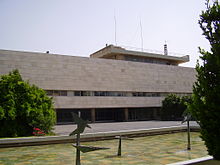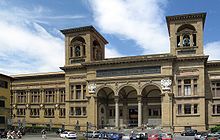- National library
-
A national library is a library specifically established by the government of a country to serve as the preeminent repository of information for that country. Unlike public libraries, these rarely allow citizens to borrow books. Often, they include numerous rare, valuable, or significant works.
There are wider definitions of a national library, putting less emphasis to the repository character.[1][2]
National libraries are usually notable for their size, compared to that of other libraries in the same country. Some states which are not independent, but who wish to preserve their particular culture, have established a national library with all the attributes of such institutions, such as legal deposit.
Many national libraries cooperate within the National Libraries Section of the International Federation of Library Associations and Institutions (IFLA) to discuss their common tasks, define and promote common standards and carry out projects helping them to fulfil their duties. National libraries of Europe participate in The European Library. This is a service of The Conference of European National Librarians (CENL).
The first national libraries had their origins in the royal collections of the sovereign or some other supreme body of the state.
One of the first plans for a national library was that devised by the Welsh mathematician John Dee, who in 1556 presented Mary I of England with a visionary plan for the preservation of old books, manuscripts and records and the founding of a national library, but his proposal was not taken up.[3]
Contents
Legal deposit and copyright
The principle of legal deposit applies in some countries.
In the United Kingdom, the Legal Deposit Libraries Act 2003 restates the Copyright Act 1911, that one copy of every book published there must be sent to the national library (the British Library); five other libraries (the Bodleian Library at Oxford University, the Cambridge University Library, the National Library of Scotland, the Trinity College Library, Dublin, and the National Library of Wales) are entitled to request a free copy within one year of publication. The international nature of the book publishing industry ensures that all significant English language publications from elsewhere in the world are also included.
In the Republic of Ireland, the Copyright and Related Rights Act 2000 specifies that one copy of every book published is to be delivered to the National Library of Ireland, the Trinity College Library, Dublin, the library of the University of Limerick, the library of Dublin City University, and the British Library. Four copies are to be delivered to the National University of Ireland for distribution to its constituent universities. Further, on demand in writing within twelve months of publication a copy is to be delivered to the Bodleian Library, Cambridge University Library, the National Library of Scotland, and the National Library of Wales.
In Australia, the Copyright Act 1968 and other state Acts requires that a copy of every book published in Australia be deposited with the National Library of Australia, the relevant State Library for the state in which the book was published, and some states other libraries such as Parliamentary and university libraries.
A similar system also exists in Canada with respect to its national library, known as Library and Archives Canada, and in Quebec, the Bibliothèque et Archives nationales du Québec which has been entitled to two copies (for publications retailing at less than $250), or one copy (for publications retailing at $250 or above) of books published in Quebec since 1968.
Since 1537, all works published in France must be deposited with the Bibliothèque nationale de France. Since 1997, it has also received deposits of digital works.
Since 1661, the Swedish Royal Library has been entitled to a copy of all works published in Sweden.
In Singapore, the National Library Board Act requires all publishers in Singapore to deposit two copies of every publication to the National Library Board at their own expense within four weeks from the publication date.
Other countries, like the United States, do not follow this requirement. The United States does, however, require that any publisher submit two copies of a copyrightable work to United States Copyright Office at the Library of Congress - this is known as mandatory deposit[1] - but the Library is selective about which works it retains. The international nature of the book publishing industry ensures that all significant English language publications from elsewhere in the world are also included. It also has the Federal depository libraries, which must receive a copy of all of the publications of the Government Printing Office.
In addition to having a law requiring publishers to deposit books, those countries with legal deposits usually have many other incentives for a proper and speedy deposit, such as a tie-in with laws affecting copyright of the same documents, and/or a cataloguing- in- publication service.
Approximately three million new English-language books are retained by the British Library and Library of Congress each year.
National bibliographic control
One of the main goals of a national library is fulfilling their nation's part of the common international goal of universal bibliographic control, by ensuring the bibliographic control of all the books or book-like documents published in that particular country or talking about that particular country, in any way.
The first part of the goal is usually achieved through the means of legal deposit laws or (as is the case of the United States) by a host of different programs such as a cataloguing in publication service. By this service, the Library of Congress gives a complete catalogue entry of a book to any publisher who sends a final draft or some form of galley proof of a book currently in production. Other national libraries offer similar services or enforce mandatory practices similar to this.
The second part of the goal is achieved by thorough acquisition programs and collection development policies which target book markets in other nations, and which foster international agreements with other countries with national libraries who have national bibliographic control as one of their goals. Exchange and access protocols are defined permitting these countries to read each other's catalogues, and to standardize catalogue entries, thus making it easier for each national library to become aware of every possible published document which might concern their country.
International bibliographic control
Another one of the main goals of many a national library is the "export aspect" and the collaborative sides of the universal bibliographic control of all the books in the world. This is done by the exchanges and accords mentioned in the previous section, and also by fostering the creation of standard conceptual tools such as library classification systems and cataloguing rules. The most commonly used of these tools is the International Standard Bibliographic Description or ISBD, which has served as a basis for national and international cataloguing codes, such as AACR2.
See also
References
- ^ Line, Maurice B.; Line, J. (1979). "Concluding notes". National libraries, Aslib, pp. 317-318
- ^ Lor, P. J.; Sonnekus, E. A. S. (1997). "Guidelines for Legislation for National Library Services", IFLA. Retrieved on 2009-01-10.
- ^ Fell-Smith, Charlotte (1909) John Dee: 1527–1608. London: Constable and Company Available online
External links
Categories:- National libraries
- Types of library
Wikimedia Foundation. 2010.







